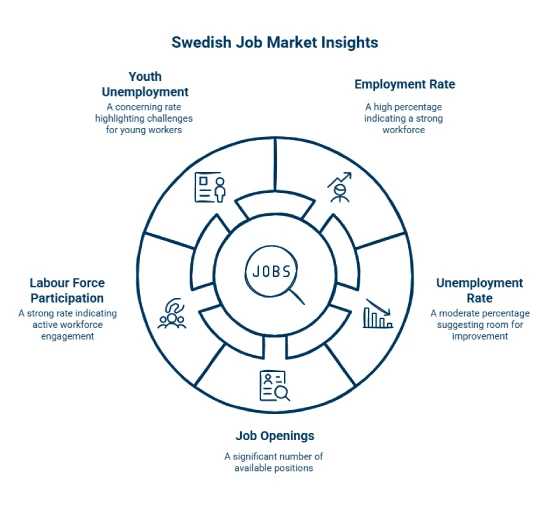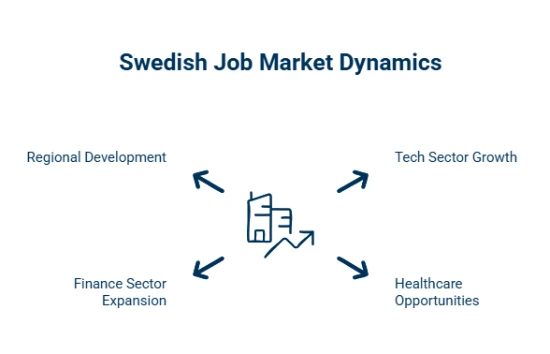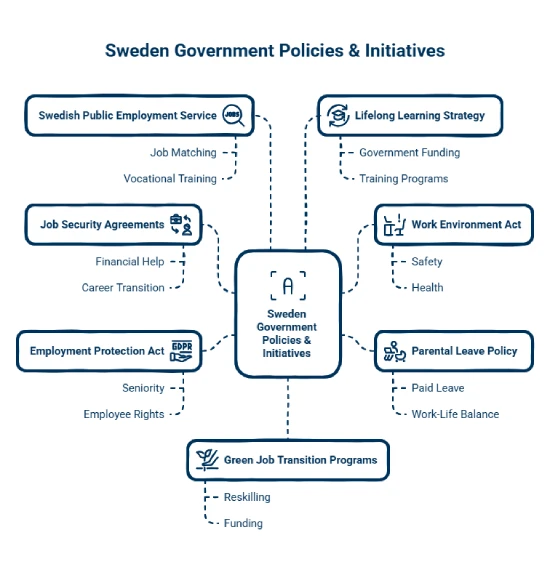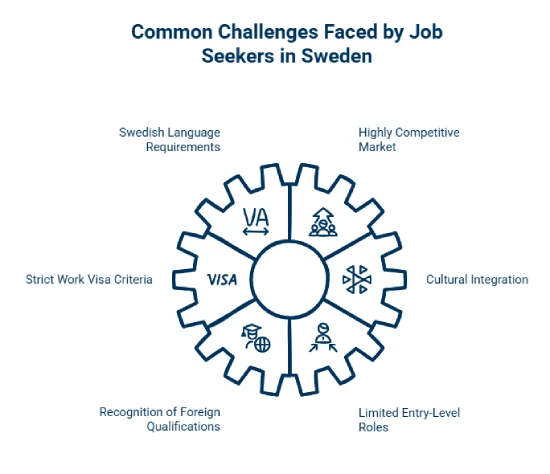
Sweden's employment rate is at 69.1%, with an unemployment rate of 8.7%. As of the first quarter of 2025, there are around 151,200 job openings, and the labor force participation stands at 75.7%. Youth unemployment is pretty high at 28.6%.
In 2025, the job market in Sweden is holding steady, thanks to a solid economy and public sector investment. There is increased activity in sectors like tech, green energy, and healthcare. With more than 150,000 job vacancies, there is a real need for both skilled workers and essential staff. The government is also pushing for more digital tools and programs to help people move easily between jobs.
Notably, fields like IT, engineering, and healthcare are growing, partly because of an aging population that requires more healthcare and social services. Sweden’s welcoming work culture and strong labour participation rates make it an attractive spot for talent from around the world.
Some key points affecting Sweden's job market in 2025 include:
*Want to work in Sweden? Sign up with Y-Axis to guide you with the process.
Sweden is seeing a big need for workers in important fields like tech, healthcare, engineering, and education. With its focus on innovation and an aging population, the country often struggles to find enough skilled workers, especially in jobs that need high qualifications and digital skills. If you are an international professional with the right experience and credentials, you have a good chance of finding great job opportunities in Sweden.
| Occupations | Salary (annually) |
| Engineering | 3,000,000 kr |
| IT and Software | 1 750 000 kr |
| Marketing & Sales | 2,080,000 kr |
| Human Resource Management | 2,139,500 kr |
| Healthcare | 1,249,500 kr |
| Teacher | 2 024 000 kr |
| Accounting and Finance | 1,660,000 kr |
| Hospitality | 500,000 kr |
| Nursing | 525,897 kr |
Read more…
Top in demand occupations in Sweden
Sweden's job market can be quite different depending on the area. Bigger cities like Stockholm, Gothenburg, and Malmö tend to pay better and have more job options, especially in fields like tech, healthcare, and finance. Even smaller cities are experiencing job growth thanks to some efforts to spread development around.

The table below has the list of top 10 cities in Sweden along with the average salary offered and the employment growth rate:
| City | Average Annual Salary (SEK) | Employment Growth Rate |
| Stockholm | 6,10,000 | 2.90% |
| Gothenburg | 5,80,000 | 2.50% |
| Malmö | 5,65,000 | 2.30% |
| Uppsala | 5,40,000 | 2.10% |
| Västerås | 5,20,000 | 1.90% |
| Linköping | 5,30,000 | 2.00% |
| Örebro | 5,10,000 | 1.80% |
| Lund | 5,55,000 | 2.20% |
| Helsingborg | 5,00,000 | 1.70% |
| Jönköping | 4,95,000 | 1.60% |
Sweden's job market is changing fast, and there is a growing demand for digital, analytical, and people skills in different industries. Employers are keen on finding candidates who have both tech know-how and good communication skills, especially because the country values sustainability and innovation.
Given below is a breakdown of the skills that are in high demand now:
| Technology Skills | Marketing Skills | Finance & Accounting Skills | Healthcare Skills | Leadership & Communication Skills |
| Software Development | Digital Marketing | Financial Analysis | Patient Care & Nursing | Strategic Decision-Making |
| Cloud Computing (AWS, Azure) | SEO/SEM | Auditing & Compliance | Geriatric Care | Team Leadership |
| Data Analysis (SQL, Python) | Social Media Strategy | Accounting & Book-keeping | Medical Technology Operations | Cross-cultural Communication |
| Cybersecurity | Brand Management | Risk Management | Mental Health Services | Conflict Resolution |
| AI & Machine Learning | CRM Management (HubSpot) | Tax Planning | Clinical Research | Public Speaking & Negotiation |
Remote work has really taken off in Sweden, especially since the COVID-19 pandemic pushed a lot of businesses online. Recent surveys from Statistics Sweden show that about 35% of workers are now doing their jobs remotely, whether full-time or part-time. The IT, finance, and professional services fields are leading the way in this shift. The Swedish government is helping out by improving internet access, supporting flexible work laws, and encouraging businesses to adopt hybrid work models.
Sweden is all about work-life balance and looking after employees, which makes it a leader in remote work practices. Many companies trust their workers and are now offering remote or hybrid positions as part of their standard job offers. Eurostat reports that Sweden is one of the top countries in the EU when it comes to remote work flexibility, and worker satisfaction is high. This trend looks like it’s here to stay, especially as companies use remote work to attract talent from abroad and lower costs.
*Want to migrate abroad? Get in touch with experts at Y-Axis for complete immigration assistance!
Sweden is well-known for its modern labour market policies that aim to keep jobs secure, ensure fair working conditions, and help workers adjust to changes. The Swedish government collaborates with trade unions and employers to create policies that work for both employees and businesses. These programs focus on increasing job opportunities, supporting skill development, and driving steady economic growth.
Here are some key initiatives and policies for workers in Sweden:

Sweden has a really good welfare system for workers. Employees benefit from a solid safety net, generous leave policies, and perks that help them balance work and life, ensure financial stability, and grow in their careers. Most of these benefits are backed by law and supported by collective agreements.
Here are some of the key employee benefits you will find in Sweden:
Sweden has a lively job market with chances in areas like IT, healthcare, engineering, and green tech. But finding a job here can be tricky, especially for those coming from abroad. It’s important to get a handle on the local work culture, language needs, and what the application process looks like.
Given below are some of the most common challenges faced by job seekers in Sweden:

*Finding it difficult to keep your resume up-to-date? Avail Y-Axis Resume Writing Services to get personalized assistance!
Sweden’s job market is open, innovative, and focused on equality and sustainability. If you are a foreign job seeker trying to make your mark here, you will need to know what to expect and adjust your approach.
Here are some tips to help you find your way in Sweden’s job scenario:
Sweden's job market is doing well, supported by a stable economy and a booming tech scene. There is a steady need for skilled workers in areas like healthcare, IT, and engineering. As of 2024, the unemployment rate is about 7.6%, with expectations for it to get better in the next few years. The country is experiencing a shortage of workers in key fields such as healthcare, construction, education, and IT, especially in rural areas.
There are more than 150,000 job openings listed on sites like Arbetsförmedlingen, showing a strong demand for local and international talent. On average, people in Sweden earn around SEK 494,000 a year, with the best-paying jobs in tech, finance, and life sciences. The job market is also seeing more flexible and remote work options, which fits with Sweden's modern work culture and digital setup.
With welcoming labour policies, a clear work environment, and a strong commitment to sustainability, Sweden remains a great place for skilled workers from abroad.
*Are you looking for step-by-step assistance with Swedish Immigration? Contact Y-Axis, the leading visa and immigration consultancy in Canada!
Explore what Global Citizens have to say about Y-Axis in shaping their future
Canada PR Visa
Sameer got Permanent Resident Visa for C
Read More...
Canada Work Permit Visa
Varun provided us with great Y-Axis Revi
Read More...
Canada PR Visa
One of our client Virendra availing his
Read More...
Sweden's job market is bouncing back and changing shape. There are more job openings in important areas like IT, healthcare, and construction as the country focuses on things like digitization and sustainability. The Swedish Public Employment Service predicts that jobs will keep growing in these sectors over the next few years.
Sweden's labor market is holding strong despite some tough global economic times. Statistics Sweden reports that the employment rate is around 68.3%, with unemployment at about 7.5%. Key fields like ICT, health services, and education are creating plenty of jobs. There is a big demand for skilled professionals as well as technical workers.
Looking ahead, Sweden is likely to keep needing more professionals in digital fields, sustainability, and healthcare. The job market is shifting toward roles that require higher skills, driven by trends like AI and an aging population. By 2035, it’s expected that close to half of new jobs will need higher education, especially in tech and healthcare.
Sweden’s job market stands out for its digital growth, gender equality, and openness to foreign workers. The push for innovation and sustainability has led to new jobs in IT, renewable energy, engineering, and social services. Major cities like Stockholm, Gothenburg, and Malmö have the most opportunities in tech and finance.
Some of the most in-demand jobs in Sweden are as follows:
Note: These roles are in demand due to an aging population, technological changes, and infrastructure needs.
Sweden is relying more on international talent, especially in areas with labor shortages. The country has a straightforward work visa process for skilled workers and graduates from Swedish universities. Still, being proficient in Swedish and having the right certifications can play a big role in employment chances. Stockholm and Gothenburg are popular spots for global job seekers, particularly in tech and science sectors.
One of the hottest jobs in Sweden right now is Software Developer. With the country moving quickly into the digital age, there is a growing need for skilled professionals who know programming, software engineering, and systems development. The Swedish Public Employment Service (Arbetsförmedlingen) says IT jobs, especially for software and system developers, are often in short supply. These roles pay well, averaging between SEK 45,000 and 60,000 a month, and you can find plenty of opportunities in big cities like Stockholm, Gothenburg, and Malmö. Companies are also open to hiring international candidates, particularly those who have experience and speak English well.
According to Statistics Sweden, the average monthly salary is around SEK 38,000 (about €3,270 or USD 3,540). Salaries vary by field:
Note: The wages in major cities like Stockholm and Gothenburg tend to be higher, reflecting the cost of living.
Yes, Sweden is still a great place for skilled workers to apply for jobs. It has a stable economy, a high standard of living, and strong worker rights. With a straightforward work permit process and growing demand across various sectors, it’s a good time for international candidates, especially in IT, healthcare, and engineering.
Latest data shows that about 20–25% of Sweden’s workforce is made up of foreign-born individuals. Many immigrants work in services, healthcare, manufacturing, and tech fields. The government has rolled out programs to help skilled migrants find jobs, including faster visa processing and job matching.